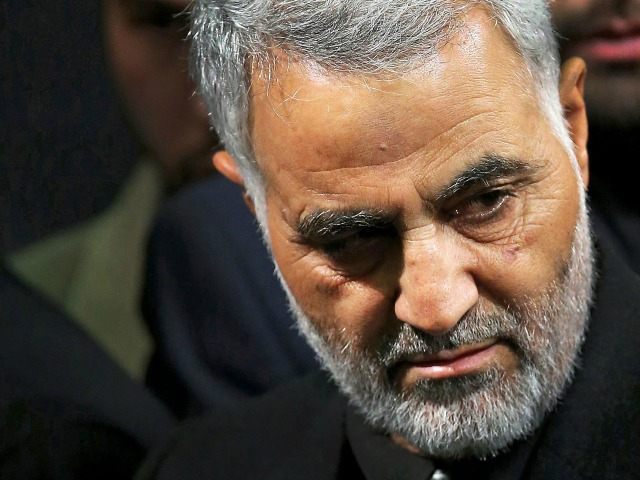Iranian elite paramilitary force leader Major General Qassem Soleimani accused the United States of having “no will” to fight the Islamic State in Iraq and Syria and blasted President Barack Obama as not having “done a damn thing” to quell the terrorist insurgency. The remarks follow news that Shiite terrorist group Hezbollah is planning to increase its presence in Iraq to combat ISIS.
Soleiman, who heads Iran’s Quds Force tasked with special operations, was quoted by Iran’s Tasnim news agency as stating that “nobody is present” in the war on the Islamic State, aside from the government of Iran, and that the United States is particularly guilty of negligence in the war.
“Obama has not done a damn thing so far to confront Daesh: doesn’t that show that there is no will in America to confront it?” Soleimani reportedly said, echoing remarks American Secretary of Defense Ashton Carter made on Sunday that it was the Iraqi military that had shown they lack the “will to fight” against the Islamic State.
“How is it that America claims to be protecting the Iraqi government, when a few kilometres away in Ramadi killings and war crimes are taking place and they are doing nothing?” Soleimani asked. His criticism of the Obama administration echoes that of many within the United States who would like to see a more prominent role for the United States in the struggle, as well as the containment of an increasingly militarily belligerent Iran. “How is it that ISIS is seizing territory on two fronts, 10 months after US airstrikes began?” asked House Foreign Affairs Chairman Ed Royce last week, decrying the passive role the Obama administration had taken against the Islamic State.
“It’s dreadfully obvious that we aren’t working well enough to defeat ISIS and protect the people of Palmyra and its precious relics of our shared history,” he added. Palmyra and Ramadi, Iraq, both fell last week to the terrorists, and mass murders have been reported of both civilians and military personnel in both.
In an interview with The Atlantic‘s Jeffrey Goldberg last week, President Obama stated that America was winning the war on the Islamic State. “Ramadi had been vulnerable for a very long time, primarily because these are not Iraqi security forces that we have trained or reinforced,” the President stated, asserting, “No, I don’t think we’re losing.” The interview was printed shortly before news arrived in the West of the fall of Palmyra.
President Obama’s statements appeared to be more in line with what the Iraqi government had been expecting of American officials than Carter’s. “Carter was likely given incorrect information because the situation on ground is different,” said Iraqi government spokesman Saad al-Hadithi of his “will to fight” remark.
The Iranian presence in Iraq has grown significantly to combat the Islamic State in the past few months, both officially and unofficially. Iran is currently embroiled in a battle to keep ISIS from fully controlling Baiji, an oil center in Iraq. As early as March, the Shiite terrorist group Hezbollah agreed to send 800 fighters to Iraq to fight ISIS and work alongside Iranian forces. The move, some lawmakers have suggested, was intended to prevent a situation in which American ground troops became necessary and overshadowed Iran’s presence.
In a speech from Lebanon this week, Hezbollah chief Hassan Nasrallah promised yet another increase in the number of Hezbollah fighters in Iraq, calling for a united international response against ISIS. “Today we are facing a kind of danger that is unprecedented in history, which targets humanity itself,” he said, calling for no one to “bury their heads in the sand.”
“We are present today in many places and we will be present in all the places in Syria that this battle requires,” Nasrallah promised.
The Islamic State itself appears to see Iran as a bigger threat than anti-ISIS Sunni governments. In an article in the latest issue of its official magazine, Dabiq, an Islamic State writer posits that ISIS will win because the coalition against it is too busy fighting amongst themselves, rather than fighting ISIS. Particularly, the article notes that the “apostate triad” of Turkey, Saudi Arabia, and Qatar are working harder to appease the United States than maintain control of the region, and that they are losing ground to Iran:
Through all this, the apostate triad intended to “prove” to their crusader masters that they were still essential to the future of the region, that they had the power to influence the outcome there, and that their opinion mattered when it came to American-Rāfidī [Iranian] relations and the issue of Rāfidī [Iranian] nuclear ambitions. Essentially, it was greed, fear, and envy which moved them. They wanted themselves, not the Rāfidah [Iran], to be the favored allies of their crusaders.

COMMENTS
Please let us know if you're having issues with commenting.